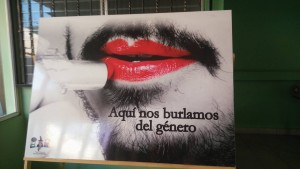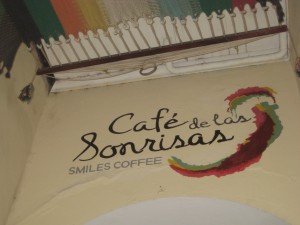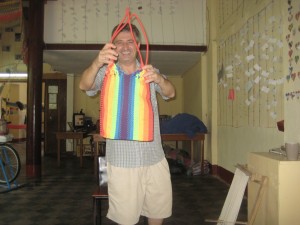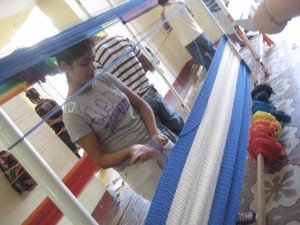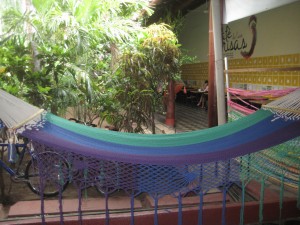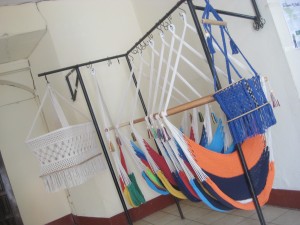Hello! My name is Ishrat and I am a junior at The Ohio State University majoring in International Studies with a minor in Human Rights. My roommate, as well as my partner for this blog is Ashley Short. Ashley will be a third year senior this Autumn, majoring in Social Work with a minor in City and Regional Planning. We are on our study abroad trip in Nicaragua, sponsored by the College of Social Work at OSU. Our program’s focus is social issues and human rights in Nicaragua. We are visiting several organizations in three different cities in Nicaragua to learn about the social issues and human rights issues that is taking place in this country. In this blog, we will be sharing our experiences and what we are learning from this trip. So let’s begin!
Ishrat:
We were faced with a blast of heat the moment we stepped out of the airplane and that is where our two week journey in Nicaragua began. After recovering our luggage, we met our tour guide, Cesar. Our van arrived in fifteen minutes and we were soon on the way to our hostel in Managua. Managua is the capital city of Nicaragua. If you ever visit Managua, you will learn that this city is noticeable for its colorful steel tree displays that span across a good amount of the capital.
A wonderful incorporation in our study abroad itinerary are the home stays. I have been looking forward to the home stays since the day I learned that we would have this opportunity. During our first day in Managua, we visited Mark Lester at CGE(Center for Global Education) to learn about the political and and economic situation of Nicaragua. Over just about one and a half hour,we were better informed on Nicaraguan history and how the country has gotten to where it is currently. In the afternoon, we had chicken, rice, Pinto beans, stir fried vegetables, and fruits for lunch at CGE. I have to say that I was a little surprised to see that this center had chefs and a kitchen to cook for groups that visited, when I thought it was only used for office or classroom space.
After a day in Managua, we packed for our home stay in Leon. Suggested items to bring were mosquito repellent and a mosquito net since we were staying in a rural area. Our drive to Leon took approximately two hours. Once we got to Leon, we were greeted by friendly staff at the National Autonomous University of Nicaragua or UNAN. UNAN is a state funded public university in Nicaragua. It’s second campus is located in Leon and that is where we were introduced to our host mother Gloria, for the three days we were staying there.
To give you an idea, Gloria was a petite woman probably in her fifties. My first impression of Gloria was someone who was very calm and friendly; I learned that she was exactly as I thought she was during the three days we stayed at her home. She was kind, friendly, and very hospitable.
From our home stay, I learned to never be afraid of language barriers. Although Ashley and I were not fluent in Spanish, it was nice to know that we were able to create meaningful conversations with Gloria, even with our limited knowledge of the language. We talked about everything from our families, to what was happening on a television show, to what we wanted to eat for lunch. However, I do not want to completely ignore the fact that I had previously taken six years of Spanish, so this home stay as well as my entire visit to Nicaragua has really been helping me regain some of the conjugation as well as vocabulary that I had learned previously. Anyway, to put it altogether, do not be afraid to start a conversation with someone who speaks a different language than you. Your facial expressions, hand movements and knowledge of just even a few words of the language can help you start a conversation to learn something new or meet someone new.
The infrastructures in the neighborhood were pretty similar to the ones in Managua, and really the entire country. Most were colorful cement houses with roof shingles. I have even seen houses made from tins in some areas. Gloria’s apartment was on the second floor of a building. The outside of her apartment had very open space and there was only one other apartment across on the second floor. Gloria’s house contained very minimal furnishings, which is very understandable considering the fact that she is the only person living there. She does have three children but they are older and on their own. Within fifteen minutes of sitting inside her home, we were introduced to Chocoito, her pet parrot. I found it funny when she told us how talkative he is, at night and even more so in the morning. During one conversation, we learned that Gloria is a seamstress and first learned to sew when she was twelve years of age. She even showed us a beautiful pink Quinceañera dress that she made for a client that week. Overall, it was such a wonderful opportunity to be able to stay with Gloria at her house. She was friendly, welcoming and made me feel comfortable at her home.
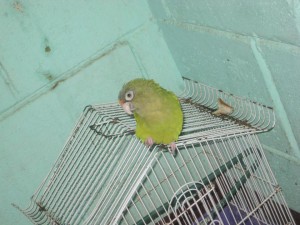
Chocoito! Gloria’s pet parrot.
From this home stay, I saw the beauty of simplistic living. It is important that we take the time to find happiness with the people around us and in the things we do rather than objects and materials. I was also able to experience what it is like to live in a Nicaraguan community. Nicaraguans are kind, genuine people living together and looking out for one another in times of need, as we should all do with our own neighbors. This home stay has really been a great experience for me and I will forever be thankful to Gloria and the UNAN, Leon community for giving all of us this wonderful opportunity!
From this home stay, I saw the beauty of simplistic living. It is important that we take the time to find happiness with the people around us and in the things we do rather than objects and materials. I was also able to experience what it is like to live in a Nicaraguan community. Nicaraguans are kind, genuine people living together and looking out for one another in times of need, as we should all do with our own neighbors. This home stay has really been a great experience for me and I will forever be thankful to Gloria and the UNAN, Leon community for giving all of us this wonderful opportunity!
Ashley:
It might be that the times I have traveled before have been glossed over in my memory, but our day of travel to Nicaragua has been one of the hardest days of our entire trip for me. The flights seemed endless, I was sick, and ready to be in Nicaragua and truly begin our study abroad.
Prior to our trip, I had struggled through a difficult semester of classes and a challenging period of mental health struggles. I am quickly approaching my senior year and the prospect of life after graduation is scary to me. I have had life plans for as long as I can remember and I do not yet have concrete plans for after graduation. I wanted to participate in a study abroad because of the experience, learning, and exposure that it could give me that sitting in a classroom in Columbus, Ohio could not. I have been blown away by the group I am traveling with, our instructors, our guide, and every individual and organization who has given their time and resources to help create this experience. This trip has given me the opportunity to travel, learn, and gain immense perspective, and so much more. This trip is helping to mold my future and give direction to the decisions I will make. My experiences have been invaluable and I have been deeply impacted. The learning I have gained from this trip will make me a better social worker, professional, and human being. I am deeply grateful.
I have been to Nicaragua once before and upon arriving, things felt both familiar and very different. I was expecting the arrival to be comfortable to me- simply returning to a place I have had wonderful experiences before. The reality, however, was that my memories and the country before me were different. More accurately, I noticed that I was different than who I was in my previous travel, and this impacted what I saw and how I saw the country.
Typically I am quickly overwhelmed by pain and struggles of others. Though this has been the norm for me, it has taken me about a week to begin feeling overwhelmed on this trip, for many reasons. These reasons include nausea for days, heat exhaustion, intense sunburn, which seemed to numb me emotionally and mentally. One of my goals for the trip has been to stay engaged and actively reflect on all of the experiences we are having. Nonetheless, the week has as gone by quickly, experiences are beginning to run together, and I am realizing we are over halfway through the trip. I am loving Nicaragua and the realization that our time together here in the country will soon be over is saddening. I have loved every single one of the organizations and individuals we have met with. Though there is no way I could pick a favorite, our meeting with a woman named Juanita hit me with particular force. In other meetings I have been deeply moved and impacted by the speakers and their experiences and efforts, but Juanita’s story this a morning moved me to tears. Though all women come from a long lineage of strong women before them (something else I have learned here in Nicaragua), Juanita’s particular experiences as a transgender woman in Nicaragua have re-emphasized for me the human rights issues individuals on the LGBTQ+ spectrum have faced and continue to face all across the world. The violations Juanita faces every day prevent her from having the freedom to be who she is and force her to present herself to the world in an act that has distinct contrast to who she actually is. Her wisdom was profound to me, as she explained the importance of conversations about power, access to power, and inequality. Juanita also explained the power of “humanizing the struggle of others.”
Later in the day, we finally returned to our hotel after a few more meetings with other people and organizations when I read yet another article about the issue some people have with transgender people using public bathrooms. To clarify, the issue I am identifying is some people’s concern over the bathroom use of transgender people, not actual transgender people. I genuinely want to believe most people are uninformed about this issue, and not that they actually desire to oppress already marginalized people. Yet the issue stumps me, because the biggest issue seems to be a fear of being sexually offended in bathrooms, which has nothing to do with one’s gender identity. To clarify, transgender people are people whose gender is different than their sex assigned at birth. Being transgender does not make one a sexual offender any more than being cisgender (being the same gender as the sex identified at birth) does. This means that people’s fear is of sexual offenders, not transgender people, and the issue is resolved. The real issue was faulty logic and the issue is resolved, right?
Or does it really come down to people in positions of power using the false premise and excuse of fear to continue the pattern of oppression and the violation of rights of human beings considered “less-than” for one reason or another?




